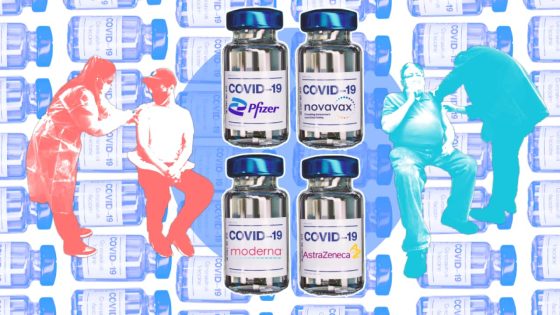Key Points
- Australia’s COVID-19 Vaccine Claims Scheme is set to close on 30 September.
- More than $32 million worth of compensation has been paid out.
- The scheme was set up to provide an avenue for compensation for those who suffered vaccine-related adverse effects.
The Australian government has paid more than $32 million in compensation to people who had adverse reactions to COVID-19 vaccines.
The federal government’s COVID-19 Vaccine Claims Scheme, set up in the months after vaccinations were rolled out in Australia, will stop accepting new claims at the end of the month.
A spokesperson for the federal Health Department confirmed the total payout figure so far to SBS News on Friday.
The scheme was set up to provide an avenue for compensation for those who suffered injury and loss of income due to getting the vaccination.
Then-prime minister Scott Morrison was among the first Australians to receive a COVID-19 vaccination in February 2021. Source: Getty / Mark Evans
Australia’s vaccine rollout
Vaccines against COVID-19 started rolling out in Australia in February 2021.
When COVID-19 was first detected in human populations towards the end of 2019, it was a new virus without an existing vaccine.
Concerns about adverse side effects including rare blood clotting, reported to have occurred in a small amount of people as a result of pharmaceutical company AstraZeneca’s vaccine, were blamed for what some described as a slow rollout of the vaccine in Australia.
Government estimates suggest the phenomenon — thrombosis with thrombocytopenia syndrome — affected around two in 100,000 people aged 60 or older, and around two to three in 100,000 people under 60 years of age.
Health authorities acknowledged that COVID-19 vaccines, like all others, had but urged Australians to get vaccinated to protect those vulnerable to the disease in the community.
When the claims scheme opened for submissions in September of 2021, then-health minister Greg Hunt said: “Serious and life-threatening side effects are very rare but to support those affected.”
At that time, there were more than 19,000 recorded active cases of COVID-19 in Australia, international travel was still restricted and Melbourne was subject to its sixth lockdown.
made it compulsory for those working in certain fields to get immunised against the virus to continue working in their roles.
More than 71 million doses of COVID-19 vaccines have been administered in Australia.
Adverse reactions
The scheme is open to those who have suffered recognised adverse effects from any of the four COVID-19 vaccines that have been approved for use in Australia.
Among the recognised potential adverse effects are heart-related conditions myocarditis and pericarditis; certain types of blood clots; erythema multiforme, which is a severe skin disorder, transverse myelitis, which inflames the spinal cord; capillary leak syndrome, which affects the makeup of a person’s blood, and an autoimmune syndrome, Guillain-Barre syndrome.
“Moderate to significant” physical injuries sustained during the administration of the actual needle are also covered.
Who can claim COVID vaccine compensation?
Those vaccinated against COVID-19 in Australia, or individuals vaccinated overseas under the Australian Government Overseas Network at any time since the vaccine rollout started in February 2021, and suffered “moderate to significant harm by the vaccine or the administration” of it, can make a claim.
Pop-up vaccination clinics were set up across Australia in halls, pavilions, shopping centres and even at Bunnings stores. Source: Getty / Dan Peled
To be eligible for compensation, people need to be able to prove their adverse reaction cost them at least $1,000 in out-of-pocket expenses or lost income.
Family members can also make a claim for a person who died having been vaccinated in Australia and subsequently suffered one of the recognised clinical conditions.
Evidence from treating doctors is required as part of claims.
According to Services Australia, compensation is determined based on the circumstances of individuals, which can include an amount for lost earnings, care services, out-of-pocket costs, and pain and suffering.
The government did not put a cap on the overall total amount of compensation that may be paid to a person.
The government had noted that part of the aim of the scheme was to reduce the risk of legal action against healthcare practitioners involved in the COVID-19 vaccination program.
The government has said while the scheme does not prevent someone from taking action through the courts, it was “designed as a streamlined alternative to court proceedings”.
COVID class action
Despite being diagnosed with pericarditis after getting her first two doses of the Pfizer vaccine, Melbourne woman Michelle Grace Hunder decided not to make a claim to the government’s scheme and has instead joined a class action against the federal government.
She told SBS News that many of the people she was in support groups with had put in claims that had been rejected, and seeing she had not had a hospital stay, which was listed as part of the eligibility criteria that is considered, she opted not to.
“Lots of people were communicating how difficult it was to get the doctors to write the correct language on the forms,” she said.
While the government has not said how many applications have been unsuccessful, Michelle Grace Hunder says she had not applied, despite having suffered adverse effects, because of the number of people she knew whose claims had been “knocked back.” Source: Supplied
Hunder said health professionals she’d dealt with were wary about linking the vaccine to health conditions, and especially to put it in writing, but eventually, a cardiologist she had seen documented that her condition “is what’s in line with what we’re seeing with vaccine-induced pericarditis”.
Hunder said most of her peers who had gone through the claims process had been “knocked back” after going through a process that “was very labour intensive, very stressful, [and] very re-traumatising”.
NR Barbi Solicitor is heading up the class action Hunder is involved in.
The firm has said about 1,800 Australians had expressed their interest in joining the action and the matter would next be in the Federal Court in Sydney in December for an interlocutory hearing.
Scheme to close soon
A spokesperson for the Health Department told SBS News any claims submitted by the closing date of 30 September would “continue to be assessed in line with the scheme policy”.
The department did not provide details about the nature of the majority of claims made so far, the number of claims made or how many had been approved for compensation.





